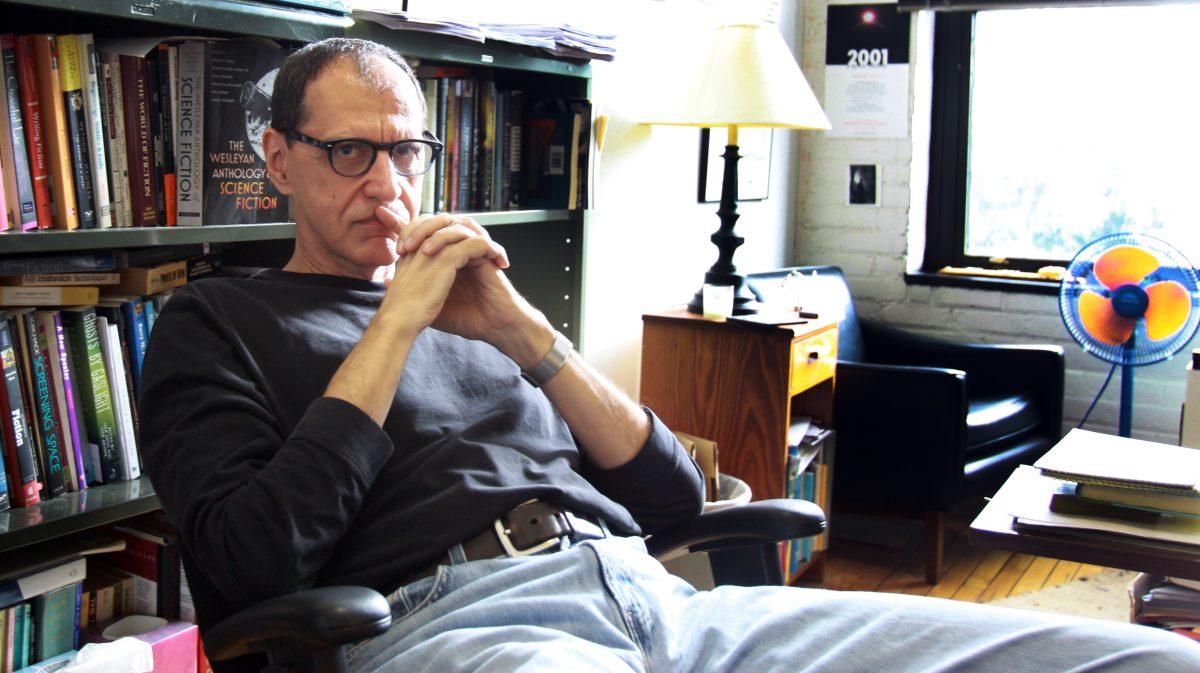John Kessel, an English professor, has loved science fiction since he was 11 years old. Kessel subscribed to science fiction magazines and would read them cover-to-cover in a week. Now he’s an accomplished science fiction writer with three published novels.
“When I was young, science fiction was the province of geeks and weirdos, not the widely popular fiction it is now,” Kessel said. “Most people went through a science fiction phase and then got over it, like having the chicken pox when you are a kid. You read it when you are a teenager, and then grow out of it. I never did.”
Corrupting Dr. Nice is his third novel, published in 1997. It follows the story of a time-traveling paleontologist who goes back to the dinosaur age to do research, but ends up getting mixed up with temporal con-artists in ancient Jerusalem.
One of the most used time travel conventions in science fiction is that if you go back into the past you have to be careful not to alter events that will change the present. A classic term for this is the grandfather paradox – if you go back and shoot your grandfather before he meets your grandmother in this convention, you will never be born. However, Kessel wanted to try something a little different with time travel in Corrupting Dr. Nice.
“I wanted to write a version of time travel where you could go back into the past and do whatever you wanted and alter whatever you wanted and it would have no effect on the present. So I thought out this scheme of moment universes [that are like] parallel branches on the tree of time where you could alter the past, but it ends up not affecting things.”
For the characters in Corrupting Dr. Nice, this means it’s possible to exploit the past. Consequently, there are tourist hotels that people from any century can visit throughout all of history. For example, the setting of the novel, Jerusalem in 40 C.E., is complete with a fancy hotel that hosts dozens of tourists from all different eras. Jerusalem now has modern medicine, cars and elevators. The city is even temporarily home to a dinosaur from the late-Cretaceous era.
However, Kessel didn’t just stick to science fiction in Corrupting Dr. Nice – he mixed in some comedy as well. “It’s a screwball comedy, which means there is a male hero who is clever, but socially maladroit. He meets this stunningly beautiful woman whom he falls in love with, and she’s a lot smarter than he is in the ways of the world.”
The male hero Kessel is referring to is the rich paleontologist, Dr. Owen Vannice, and the beautiful woman is Genevieve Faison, who works with her father, August, as an accomplished con artist. This complicates her relationship with Vannice, to say the least.
“The storyline of the book really borrows from a number of classic Hollywood comedies from the 1930s and 40s,” Kessel said. “In the beginning, I dedicate the book to a bunch of different movie directors.”
One of the challenges Kessel faced while writing this novel was incorporating both genres of science fiction and comedy. He did this by adding humor and sarcasm, along with social satire. According to Kessel, the novel also takes a satirical look at how people behave in the past and present.
“I would not say it was easy, but it was an interesting challenge to find ways to merge opposites or things that most people consider incompatible. That is one reason to write: to make something you have not seen before.”
Kessel also explained that projected himself into the mind and situation of each character while penning his novel.
“All of the characters have some element of me in them.” Kessel said. “When young, I was very much as awkward as Owen is. I have an admiration for the con artist and am sarcastic like Genevieve. I am a father like August and protective of my daughter.”
Kessel is now working on his fourth novel, which he plans to finish writing by the fall and get published in over a year. It’s set in the year 2140, in a lunar colony.
“I’m excited and eager to finish,” Kessel said. “Also [I’m] a little nervous, but I’m intending to make it entertaining and thought-provoking.”








